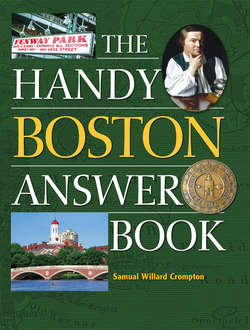Читать книгу The Handy Boston Answer Book - Samuel Willard Crompton - Страница 22
На сайте Литреса книга снята с продажи.
KING GEORGE III AND HIS COLONISTS
ОглавлениеHistory tells us that King George III is responsible for many of the problems between Old England and American colonists. What was he like?
When he ascended the British throne in October 1760, George III was twenty-two years old. He succeeded not his father, who had died, but his grandfather, King George II.
Both to his English subjects at home and the American colonists, George III seemed a big improvement on his grandfather. The “Georges,” as Bostonians sometimes call them, were a German family who inherited the English throne after the death of Queen Anne in 1714. King George I spoke virtually no English, and George II spoke it haltingly. George III, by contrast, was English born and bred, and he was sometimes so well liked in England that his subjects called him “Farmer George,” referring to his love of the land and agriculture. George III had one bad trait, however: he was determined to make the crown more powerful, both in Old England and America. And he had an innate stubbornness that pushed him to move ahead even when he should, by reason, have slowed down.
King George III reigned over Britain during the American Revolution. He was popular in England, but reviled in America.
Did Bostonians and Americans recognize that they were in for a difficult time with George III?
They did not. The succession of George III brought a wave of congratulations and applause from the American colonists. Boston, however, encountered difficulty long before running into any problems with the monarch. In February 1761, the town was hit by another of the “Great Fires” which bedeviled its existence. This fire was so extensive that commerce, as well as individuals, suffered for years to come.
Bostonians had dealt with financial difficulty for so long that it seemed perpetual. Not only had commerce fallen off with fewer ships visiting than in previous decades, but the collection of town taxes was significantly in arrears. Some people blamed the lax tax collectors, one of whom was Samuel Adams.
One normally has the impression of Boston being quite powerful. Could Boston not leverage its position as capital of the Massachusetts colony?
In earlier times that was possible. By 1760, however, the towns of central and western Massachusetts had gained leverage of their own. Though Boston was the capital, the Great and General Court was largely controlled by men from the inland towns. They might sympathize with Boston’s economic woes, but they could not and would not rescue it.
If the American Revolution had not taken place, might Boston’s plight have been even worse?
Yes, indeed. It’s quite possible that the town would have languished for decades.
